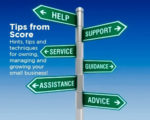Financial Management – Cash Management
 Question: I have heard from many of my peers that managing cash is the most important element in assuring the success of my business. For a small business, “Happiness is positive cash flow.” Focus on cash management, not profit. Most small businesses fail due to running out of cash, not because they are not generating profit. What are some hints that experienced small businesses use to manage their cash flow?
Question: I have heard from many of my peers that managing cash is the most important element in assuring the success of my business. For a small business, “Happiness is positive cash flow.” Focus on cash management, not profit. Most small businesses fail due to running out of cash, not because they are not generating profit. What are some hints that experienced small businesses use to manage their cash flow?
Answer: Plan your need for cash. Generate a source and use of funds so that you don’t experience any surprises regarding the working capital needs for cash resulting in an operating crisis. If you have the need for inventory of fertilizer for fall lawn maintenance, then you need to plan the ordering and payment of your inventory so you have the cash on hand to pay for the product and not put you in a bind not being capable of providing the contracted services since you don’t have the materials needed. Plan your cash needs month by month. On Cape Cod, most businesses are seasonal with high cash flow in during the season and lower during the off season. You need to plan your cash, so you have adequate cash to manage your business in the lower cash flow months.
Decide on your terms of payment up front and get an agreement with your customer. If your terms are payment at the time of service or pick-up, i.e., no credit, stick with it. If your terms are net 30 days, on the 30th day call if you don’t have a payment. Don’t wait 45 or 60 days before you call. If you are signing an annual contract for window cleaning or lawn maintenance or computer service and your terms are net 30 days, and there are net 45 days, don’t assume your terms will be accepted. Negotiate upfront when you will get payment. If you invoice for your services on a monthly basis, define upfront if payment is not made within ten days of receipt of the invoice. No surprises.
Invoice quickly. Set up automatic invoicing for long term contracts, i.e., seasonal programs. If the service provided is on-off, then invoice immediately. The quicker you invoice, the quicker you have cash in your account.
Make it easy. If you expect payment upon completion of service, accept more than just a check. Set up an online payment service such as a “Square” account so you can accept credit cards from your mobile device or PayPal or sign up for an AMEX phone-in service. The easier you make it, the faster you will get paid. You can also set up a direct debit arrangement, where the client’s account is automatically debited the amount you and the customer agree up. Check with your bank to see what services they offer.
If you have an ongoing relationship, i.e., bi-weekly lawn service, arrange for a specific payment plan up front. For example, you will invoice monthly with payment due in 10 days after receipt. If payment is not received in 10 days, what will the consequences be? Define it upfront. If you do not receive payment in 10 days will you call to check that they received the invoice? If you allow the payments to go unpaid, it will get more and more difficult to get payment. Staying ahead of the payments is your best policy.
Provide rewards for on-time payments. For example payment upon receipt (received within ten days) will receive a 2% discount or rebate at the end of the season or on-time payments for the lawn maintenance season will receive one complimentary fall fertilizer treatment.
It is OK to “fine” those that are perpetually late but make sure the “fine” is defined up front. If your terms are net ten days, and if the payment is not received within 20 days of invoicing a 5% penalty for late payment will be added, not to exceed $25 and invoiced the following month.
Check your bank account daily. Stay on top of cash flow. No one else will.
Always look for ways to reduce your cash outflow. Negotiate credit terms with your suppliers the same as you negotiate payment terms with your customers. Delay outlays as long as possible to assure you have adequate cash-on-hand to deal with operating issues Day-in and day-out.
Have a good accountant that can assist you in managing your cash. If an accountant is not in your operating plan, then find a bookkeeper than can help you keep an eye on cash and give you a heads-up when issues arise.
Whether your short term goals are maintaining your business as is or growing it, managing your cash is second only to generating sales as the primary role of a small business owner.











